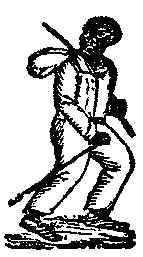ARRIVAL FROM WASHINGTON, D.C
GEORGE JOHNSON, THOMAS AND ADAM SMITH
 $300 REWARD. — Ran away from Kalorama, near Washington City, D.C., on Saturday night, the 22d of August, 1857, negro man, George Johnson, aged about 25 years. Height about six feet; of dark copper color; bushy hair; erect in stature and polite in his address.
$300 REWARD. — Ran away from Kalorama, near Washington City, D.C., on Saturday night, the 22d of August, 1857, negro man, George Johnson, aged about 25 years. Height about six feet; of dark copper color; bushy hair; erect in stature and polite in his address.
I will give the above reward if taken in a free State; $100 if taken within the District of Columbia, or $200 if taken in Maryland. In either case he must be secured so that I get him.
MISS ELEANOR J. CONWAY, Baltimore, Md.,
or OLIVER DUFOUR, Washington City, D.C.
sl-eod 2w.
"Polite in his address" as George was, he left his mistress, Eleanor J. Conway, without bidding her good-bye, or asking for a pass. But he did not leave his young mistress in this way without good reasons for so doing.
In his interview with the Committee about five days after his departure from his old home, he stated his grievances as follows: "I was born the slave of a Mr. Conway, of Washington, D.C." Under this personage George admitted that he had experienced slavery in rather a mild form until death took the old man off, which event occurred when George was quite young. He afterwards served the widow Conway until her death, and lastly he fell into the hands of Miss Eleanor J. Conway, who resided in Baltimore, and derived her support from the labor of slaves whom she kept hired out as was George. Of the dead, George did not utter very hard things, but he spoke of his young mistress as having a "very mean principle." Said George, "She has sold one of my brothers and one of my cousins since last April, and she was very much opposed to freedom."
Judging from the company that she kept she might before a great while change her relations in life. George thought, however agreeable to her, it might not be to him. So he made up his mind that his chances for freedom would not be likely to grow any better by remaining. In the neighborhood from which he fled he left his father, mother and two sisters, each having different owners. Two brothers had been sold South. Whether they ever heard what had become of the runaway George is not known.
Thomas, the companion of George, was of a truly remarkable structure; physically and mentally he belonged to the highest order of the bond class. His place of chains was in the city of Washington, and the name of the man for whom he had been compelled to do unrequited labor was William Rowe, a bricklayer, and a "pretty clever fellow, — always used me well," said Thomas. "Why did you leave then?" asked a member of the Committee. He replied, "I made a proposition to my master to buy myself for eight hundred dollars, but he refused, and wanted a thousand. Then I made up my mind that I would make less do." Thomas had been hired out at the National Hotel for thirty dollars a month.
Adam was well described in the following advertisement taken from the Baltimore Sun:
 $300 REWARD. — Ran away from the subscriber, near Beltsville, Prince George's county, Md., on Saturday night, the 22d of August, 1857, Negro Man, Adam Smith, aged about 30. Height 5 feet 4 or 5 inches; black bushy hair, and well dressed. He has a mother living at Mr. Hamilton's, on Capitol Hill, Washington, D.C.
$300 REWARD. — Ran away from the subscriber, near Beltsville, Prince George's county, Md., on Saturday night, the 22d of August, 1857, Negro Man, Adam Smith, aged about 30. Height 5 feet 4 or 5 inches; black bushy hair, and well dressed. He has a mother living at Mr. Hamilton's, on Capitol Hill, Washington, D.C.
I will give the above reward if taken in a free State; $50 if taken in the District of Columbia or counties of Montgomery and Prince George's, or $100 if taken elsewhere and secured so that I get him.
ISAAC SCAGGS.
a27-6t*
With his fellow-passengers, George and Thomas, he greatly enjoyed the hospitalities of the Underground Rail Road in the city of Brotherly Love, and had a very high idea of Canada, as he anticipated becoming a British subject at an early day. The story which Adam related concerning his master and his reasons for escaping ran thus:
"My master was a very easy man, but would work you hard and never allow you any chance night or day; he was a farmer, about fifty, stout, full face, a real country ruffian; member of no church, a great drinker and gambler; will sell a slave as quick as any other slave-holder. He had a great deal of cash, but did not rank high in society. His wife was very severe; hated a colored man to have any comfort in the world. They had eight adult and nine young slaves."
Adam left because he "didn't like the treatment." Twice he had been placed on the auction-block. He was a married man and left a wife and one child.
 $300 REWARD. — Ran away from Kalorama, near Washington City, D.C., on Saturday night, the 22d of August, 1857, negro man, George Johnson, aged about 25 years. Height about six feet; of dark copper color; bushy hair; erect in stature and polite in his address.
$300 REWARD. — Ran away from Kalorama, near Washington City, D.C., on Saturday night, the 22d of August, 1857, negro man, George Johnson, aged about 25 years. Height about six feet; of dark copper color; bushy hair; erect in stature and polite in his address.